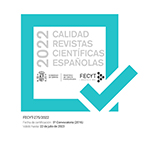Patrimonio inmaterial, comunidade e familia na antroponimia da Galicia interior (ss. XVII-XIX)
Resumen
O nome constituía unha posesión inmaterial que se recibía no bautismo e conformaba unha das principais pezas da identidade do neonato. A súa escolla respondía a uns parámetros que foron mudando conforme ao contexto, pero que, na práctica, mantiña o simbolismo que o vinculaba coa familia carnal e espiritual, así coma coa propia comunidade na que a persoa se integraba. Non se trataba da simple asignación dun nome, senón que ese nome acostumaba ser transmitido por unha persoa do seu entorno a modo de dádiva inmaterial e de demostración da relación existente. Analizar as vías de asignación ilustra a evolución que o repertorio onomástico do interior galego tivo ao longo do Antigo Réxime, amosando a forte relevancia que a familia e a comunidade tiveron. Contribúe, amais, a explicar as razóns que levaron á pronta incorporación de determinados nomes que non pertencían á onomástica tradicional galega, así como o rexeitamento a outros nomes.
Descargas
Descarga artículo
Licencia
La revista Madrygal. Revista de Estudios Gallegos, para fomentar el intercambio global del conocimiento, facilita el acceso sin restricciones a sus contenidos desde el momento de su publicación en la presente edición electrónica, y por eso es una revista de acceso abierto. Los originales publicados en esta revista son propiedad de la Universidad Complutense de Madrid y es obligatorio citar su procedencia en cualquier reproducción total o parcial. Todos los contenidos se distribuyen bajo una licencia de uso y distribución Creative Commons Reconocimiento 4.0 (CC BY 4.0). Esta circunstancia ha de hacerse constar expresamente de esta forma cuando sea necesario. Puede consultar la versión informativa y el texto legal de la licencia.








